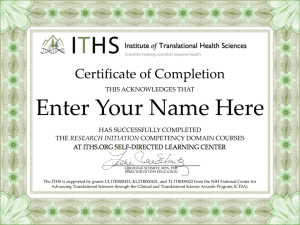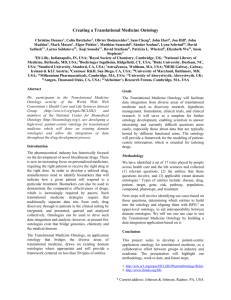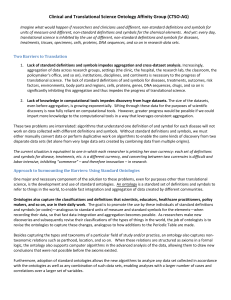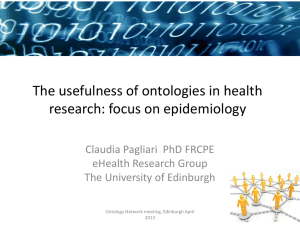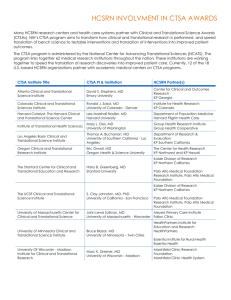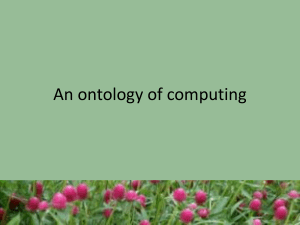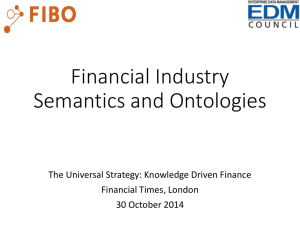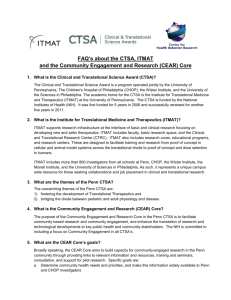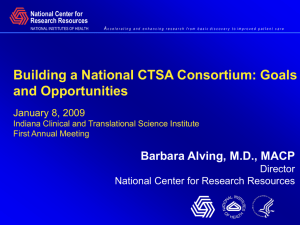CTSOAG_Operations_Pr.. - NCOR
advertisement
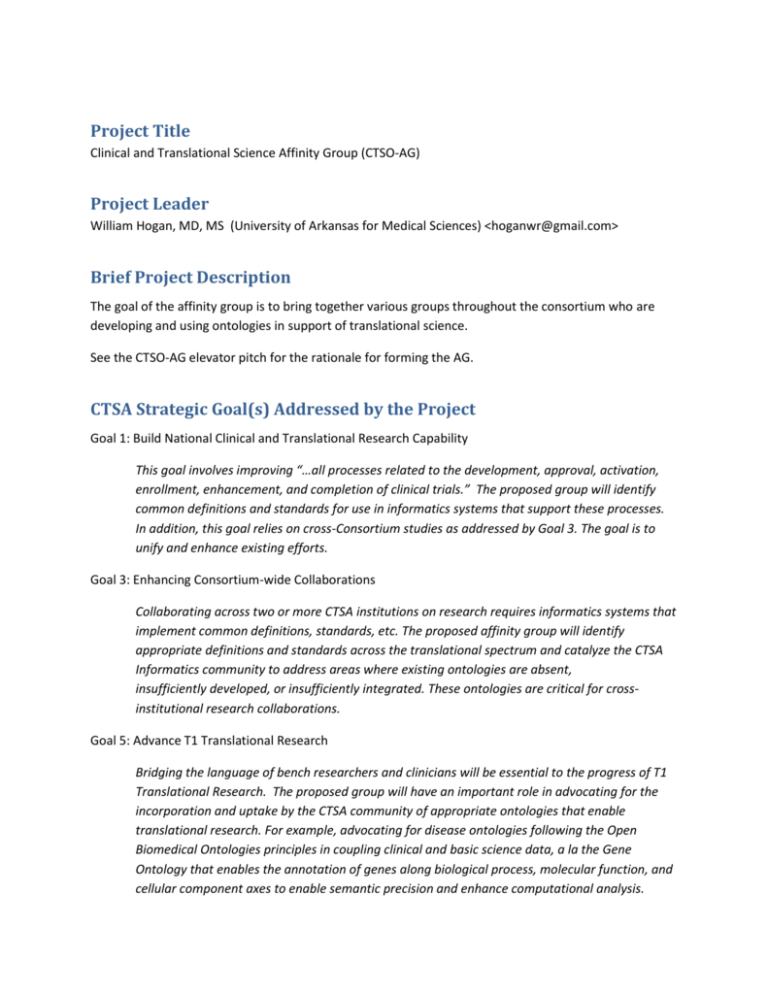
Project Title Clinical and Translational Science Affinity Group (CTSO-AG) Project Leader William Hogan, MD, MS (University of Arkansas for Medical Sciences) <hoganwr@gmail.com> Brief Project Description The goal of the affinity group is to bring together various groups throughout the consortium who are developing and using ontologies in support of translational science. See the CTSO-AG elevator pitch for the rationale for forming the AG. CTSA Strategic Goal(s) Addressed by the Project Goal 1: Build National Clinical and Translational Research Capability This goal involves improving “…all processes related to the development, approval, activation, enrollment, enhancement, and completion of clinical trials.” The proposed group will identify common definitions and standards for use in informatics systems that support these processes. In addition, this goal relies on cross-Consortium studies as addressed by Goal 3. The goal is to unify and enhance existing efforts. Goal 3: Enhancing Consortium-wide Collaborations Collaborating across two or more CTSA institutions on research requires informatics systems that implement common definitions, standards, etc. The proposed affinity group will identify appropriate definitions and standards across the translational spectrum and catalyze the CTSA Informatics community to address areas where existing ontologies are absent, insufficiently developed, or insufficiently integrated. These ontologies are critical for crossinstitutional research collaborations. Goal 5: Advance T1 Translational Research Bridging the language of bench researchers and clinicians will be essential to the progress of T1 Translational Research. The proposed group will have an important role in advocating for the incorporation and uptake by the CTSA community of appropriate ontologies that enable translational research. For example, advocating for disease ontologies following the Open Biomedical Ontologies principles in coupling clinical and basic science data, a la the Gene Ontology that enables the annotation of genes along biological process, molecular function, and cellular component axes to enable semantic precision and enhance computational analysis. Other KFCs/Expertise Required Knowledge of, or interest in, ontologies to support translational science and a willingness to consider the best manner of their integration with basic science ontologies such as GO, PRO, ChEBI, etc. Background/Significance The elevator pitch is a product of attendees at the “CTSA Ontology Workshop” in April, 2012 (http://bioontology.stanford.edu/wiki/index.php/CTSA_Ontology_Workshop). Specifically, 37 attendees from across the CTSA Consortium self-identified as being interested in developing the elevator pitch and forming the CTSO-AG. We also have engaged the support of leaders in the field of ontology who are not yet part of the CTSA Consortium, including representatives from the National Center for Biomedical Ontology, for this group and obtained their commitment to participate. Project Description The aims of this project are (1) to raise awareness of efforts across the CTSA Consortium to create, maintain, and use highquality ontologies to transform clinical and translational science, (2) to disseminate results of these efforts, and (3) to identify needs for future efforts. It will also serve as a link from the Consortium to the National Center for Biomedical Ontology. We will raise awareness of various ontology development efforts without prejudice to any particular approach. In addition the group is meant to trigger participants to contribute to development, enhancement, and integration of ontologies needed within CTSA efforts. Project Goals/Deliverables and Expected Outcomes 1. Identify and list ontology development efforts in the Consortium aimed at translational research 2. Describe the state-of-the-art in ontology evaluation by cataloging and summarizing ontology evaluation criteria from the literature 3. Identify needs for future ontology development 4. Identify best practices for integrating ontologies into software applications Links to Other CTSA Projects We will maintain close communications and relationships with the data standards and interoperability affinity group (DIAG) and Omics Data Standards Working Group of the IKFC. Included among the selfidentified list of Workshop attendees, who contributed to the elevator pitch, is Jesse Tennenbaum, leader of the Omics Data Standards Working Group. The focus of the proposed AG is both broader and narrower than that of the OMICS WG. First, it is narrower because we are concentrated on ontology and not all standards. But the focus is broader, because we are interested in ontologies to support all aspects of translational science, not just the part played by OMICS research. Like the OMICS WG, our focus is narrower than that of the overall DIAG. Therefore, we believe it appropriate that this AG exist separate from DIAG in a similar manner to the OMICS WG. Participating Institutions (at a minimum) Institution name Contact (name) University of Arkansas for Medical Sciences William Hogan <hoganwr@gmail.com>, Lead University of Texas Southwestern Medical Center Lindsay Cowell <lindsay.cowell@utsouthwestern.edu> Northwestern University Warren Kibbe < wakibbe@northwestern.edu> Oregon Health & Science University Melissa Haendel <haendel@ohsu.edu> University at Buffalo and National Center for Biomedical Ontology Barry Smith phismith@buffalo.edu, Dagobert Soergel < dsoergel@buffalo.edu > Other Institutions represented by Workshop participants who reviewed the elevator pitch and this proposal: University of Iowa, Duke University, University of Michigan, MITRE Corporation, New York University, Roswell Park Cancer Institute, Mayo Clinic, Elsevier, Oregon State University, Cornell University, Medical University of South Carolina, Emory University, University of Wisconsin, Stanford University, University of California San Francisco, Pennsylvania University Last Update July 10, 2012 Last Update Author(s) William Hogan
